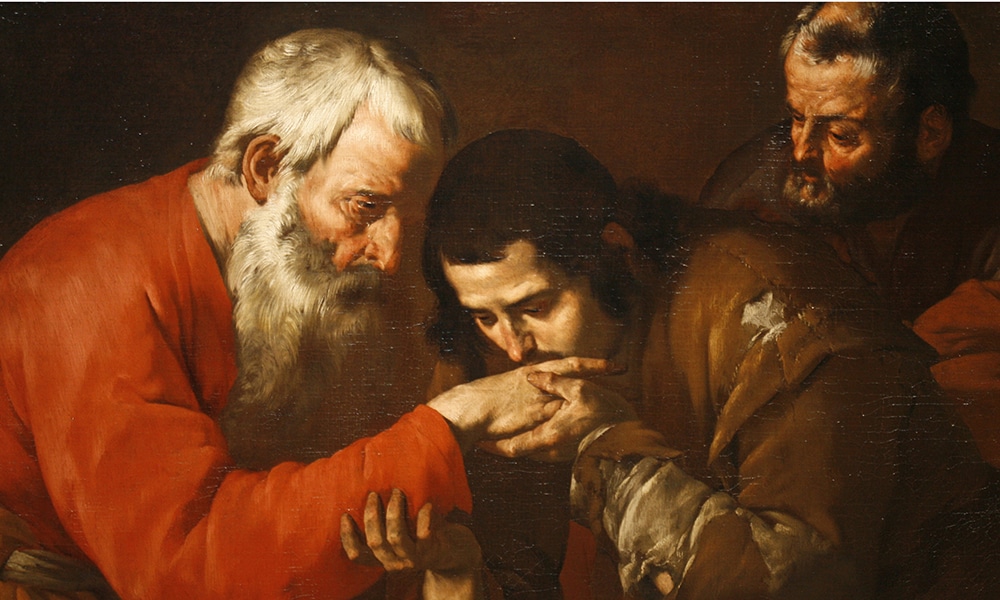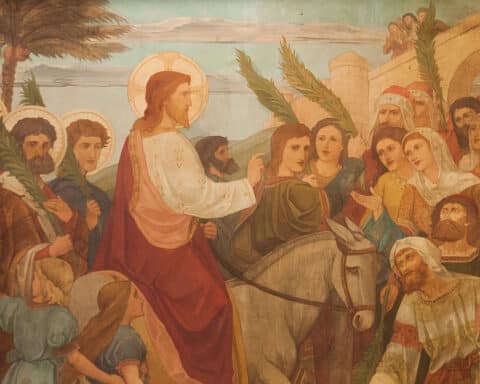
There is a God who is not merely waiting for us to return. Instead, there is a God who has come to seek us out, bringing us home to enjoy the finest banquet.
We Christians confess a prodigal, or excessively generous, God.
In Joshua, we remember the last Passover that Israel celebrated before entering the Promised Land, a land flowing with milk and honey.
The land, for Israel, was gift beyond gift. It was not something that the Israelites earned through their virtue. Jacob lied. Joseph set himself up as the most important son among his brothers. Israel grumbled against God in the desert, afraid that there would be no food. The God who rescued them from slavery in Egypt, the God who entered into their history, gave bread from heaven.
| Fourth Sunday of Lent: March 31, 2019 |
|---|
|
JOS 5:9A, 10-12
PS 34:2-3, 4-5, 6-7 2 COR 5:17-21 LK 15:1-3, 11-32 |
From this motley, unknown tribe, God would make a people. God would give land. God would dwell among them.
God gives.
The parable of the lost son underlines the prodigal generosity of this God. The youngest son wants his inheritance. He wants his father dead. The father is not a source of infinite generosity for the youngest son. Take the money and run.
Yet, the oldest son suffers from the precise same confusion. He believes that he is earning his keep from his father. He grumbles and complains that he has remained loyal to the father. He doesn’t see any value to the relationship beyond an economic one.
He cannot find a space in his heart to rejoice over his youngest brother’s return. Because he cannot fathom or imagine the generosity of his father.
Sin is a refusal to accept the prodigal generosity of the God who does not operate according to the same limited economy that we do.
To accept this generosity, the prodigal graciousness of God, requires that we are made into a new creature. The sacrifice of love on the cross reveals the prodigal generosity of God.
Jesus Christ comes into a world of power and prestige, fame and fortune, and manifests a love that has no limits — a prodigal generosity that enters into death itself.
This is the “new thing” that St. Paul addresses.
To become an ambassador of Christ means that we must live into the prodigal generosity of God. This would be impossible if it was up to us alone. But through baptism we have been made co-heirs with Christ. It is the very spirit of God that lives and breathes in us, transforming our stingy will into a prodigal one.
This is the hope that we must communicate to those preparing to enter the Church this Easter season. We Christians operate according to a prodigality that is defiant of the darkness of the limited generosity of this age.
God is inviting us to a banquet that is not dependent on our yearly income, our intelligence, our sense of style or our personal attractiveness.
It is the banquet of love unto the end where the hungry and the thirsty, the poor and the unknown, receive an outpouring of sacrificial love.
God gives beyond what is deserved. And in the Eucharist, we give back to God the only thing that God really wants in return. Our whole self.
Timothy P. O’Malley, Ph.D., is managing director of the McGrath Institute for Church Life.





